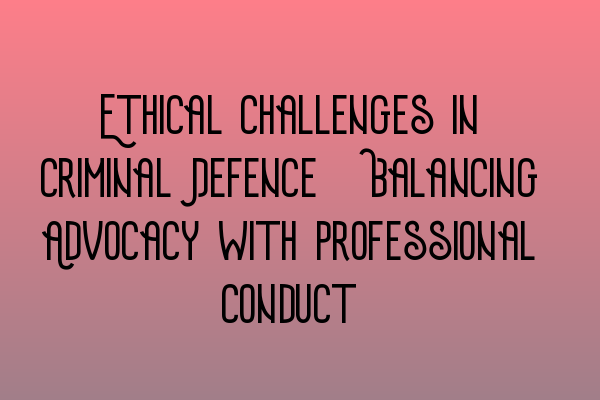Ethical Challenges in Criminal Defence: Balancing Advocacy with Professional Conduct
Being a criminal defence solicitor is a challenging profession that requires the ability to navigate complex legal issues while upholding ethical standards. Criminal defence solicitors play a crucial role in ensuring that individuals accused of crimes receive fair and just representation. However, there are ethical challenges that arise in this line of work, particularly when balancing the duty to advocate for clients with the duty to maintain professional conduct.
The Duty to Advocate
The duty to advocate is an essential part of a criminal defence solicitor’s role. It is their responsibility to present the strongest possible defence for their clients, ensuring that their rights are protected and that they receive a fair trial. This duty requires criminal defence solicitors to be zealous advocates who explore all available legal avenues to secure the best outcome for their clients.
However, there are ethical limits to the duty to advocate. Criminal defence solicitors must not engage in unethical or dishonest practices to defend their clients. They must always act within the boundaries of the law and adhere to professional conduct rules.
Balancing Advocacy with Professional Conduct
One of the key challenges for criminal defence solicitors is balancing their duty to advocate with their duty to maintain professional conduct. While the duty to advocate may push solicitors to explore every possible avenue, they must do so ethically and responsibly. This means not misleading the court, presenting false evidence, or engaging in any conduct that undermines the integrity of the legal system.
In order to navigate these ethical challenges, criminal defence solicitors must rely on their knowledge of the law, their understanding of legal ethics, and their professional judgement. They must carefully consider the consequences of their actions and always prioritize the interests of justice over their own personal interests or the interests of their clients.
The Role of Professional Conduct Rules
Professional conduct rules serve as a guide for criminal defence solicitors in navigating ethical challenges. These rules outline the standards of professional conduct expected from solicitors, and they provide a framework for resolving ethical dilemmas. By adhering to these rules, criminal defence solicitors can ensure that they maintain the highest ethical standards while fulfilling their duty to advocate for their clients.
It is important for criminal defence solicitors to stay updated on any changes or updates to professional conduct rules. By doing so, they can continue to provide effective representation while remaining in compliance with ethical standards.
Conclusion
Balancing advocacy with professional conduct is a constant challenge for criminal defence solicitors. It requires a deep understanding of legal ethics and a commitment to upholding the principles of justice. By navigating these ethical challenges with integrity and professionalism, criminal defence solicitors can effectively advocate for their clients while maintaining the public’s trust in the legal system.
For more information on the Solicitors Qualifying Examination format, LLC formation for UK entrepreneurs, business regulations in the UK, and ethical considerations in UK law, check out these related articles:
- Demystifying the Solicitors Qualifying Examination Format
- LLC Formation Made Simple: Step-by-Step Guide for UK Entrepreneurs
- LLC Formation: A Step-by-Step Guide for UK Entrepreneurs
- Business Regulations in the UK: A Comprehensive Overview
- Ethical Considerations in UK Law: Upholding Professional Standards
